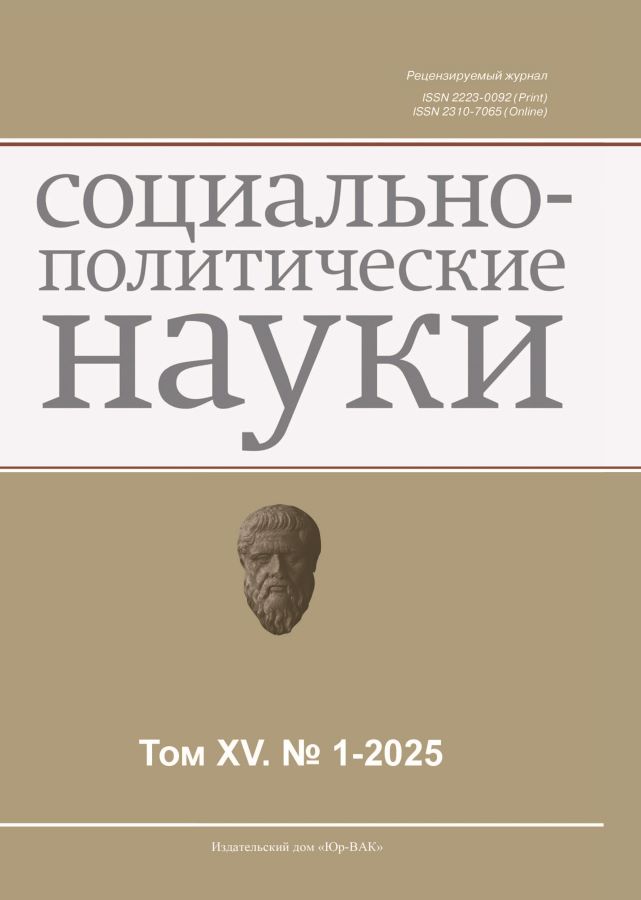Communicative, ideological and expert-analytical aspects of Government Relations (GR) in the structure of modern corporations
- Авторлар: Zubov V.V.1
-
Мекемелер:
- Financial University under the Government of the Russian Federation
- Шығарылым: Том 15, № 1 (2025)
- Беттер: 51-60
- Бөлім: Political Institutions, Processes and Technologies
- URL: https://journals.eco-vector.com/2223-0092/article/view/679139
- DOI: https://doi.org/10.33693/2223-0092-2025-15-1-51-60
- EDN: https://elibrary.ru/IOWXUP
- ID: 679139
Дәйексөз келтіру
Аннотация
This article is dedicated to understanding and detailed characterization of the current state of the GR institute in the Russian corporate sector from the perspectives of communicative, ideological and expert-analytical aspects. Using such methods as block analysis, comparison and juxtaposition, case study method, formal legal approach, the author explores GR communication technologies and channels, as well as identifies analytical and expert GR technologies. It is noted that the main communicative technologies used both in GR and in politics in general are persuasion, suggestion, imitation, and contagion. The article highlights problematic areas developed in PR campaigns within the framework of government-business relations: 1) creation of a high-quality information product; 2) image formation; 3) engagement with opinion leaders; 4) counteraction to attempts at informational discreditation. Attention is drawn to such unique features of network communications that should be taken into account when conducting PR campaigns in the interests of GR strategy, such as audience targeting and the development of non-hierarchical (horizontal) communications. It is proved that the basis for the GR strategy of major corporate sector players is the company’s ideology, which is largely determined by corporate culture – values, traditions, formalized norms of behavior, corporate style, corporate communications, irrational component, communication policy, corporate social responsibility and value proposition for employees. The conclusion summarizes the results of the study, briefly reflects the main directions for building communicative technologies in GR projects, GR channels in the context of mass political communications. It is also postulated that there is a genetic link between the ideological component of an organization’s functioning, which serves as the foundation for GR interactions, and the fundamental objectives of the company’s business activities.
Толық мәтін
Авторлар туралы
Vadim Zubov
Financial University under the Government of the Russian Federation
Хат алмасуға жауапты Автор.
Email: zubov305@yandex.ru
ORCID iD: 0000-0001-6446-3221
SPIN-код: 1747-1789
Scopus Author ID: 57211342801
Cand. Sci. (Hist.), associate professor, Department of Political Science, Faculty of Social Sciences and Mass Communications
Ресей, MoscowӘдебиет тізімі
- Destutt de Tracy A.-L.-K. Foundations of ideology. Ideology in the proper sense of the word. Moscow: Academic Project; Alma Mater, 2013. 334 p.
- Novikov O.G., Mamaeva Yu.A. Political management. Moscow: KnoRus, 2023. 236 p.
- Propaganda analysis. New York: Institute of Propaganda Analysis, Inc., 1938. Vol. 1. 84 p.
- Biryukov A.N. Improving targeting as an innovative marketing technology based on foresight practices. Industrial Economy. 2023. No. 4. Pp. 152-157. (In Rus.)
- Blagov Yu.E. ESG: Transformation of interpretations. Russian Management Journal. 2024. No. 22. Pp. 289–301. (In Rus.)
- Zakharov D.K. Creating a value proposition for employees within the framework of personnel marketing. Personnel and Intellectual Resources Management in Russia. 2018. No. 6 (39). Pp. 55–60. (In Rus.)
- Zubov V.V. Government Relations (GR) cluster in the system of business and government relations in modern Russia: Technological and procedural aspects. Sociopolitical Sciences. 2024. Vol. 14. No. 6. Pp. 52–61. (In Rus.). doi: 10.33693/2223-0092-2024-14-6-52-61. EDN: DDKXEN.
- Zubov V.V. Comparative analysis of ideological platforms of political parties in the context of political struggle (on the example of the FRG and the GDR during the Cold War). Bulletin of the Financial University. Humanities. 2022. No. 12 (4). Pp. 20–26. (In Rus.)
- Novikov O.G., Filippov A.R. Mechanisms of manipulation of public consciousness. Vlast. 2024. No. 3. Pp. 94–100. (In Rus.)
- Filippov A.R. Political ideology as a type of manipulation. Vlast. 2024. No. 3. Pp. 133–139. (In Rus.)
- Filippov A.R., Zubov V.V. Media in the era of post-industrialism: Political science aspect. In: Opportunities and threats of digital society. Materials of conference. Yaroslavl, 2024. Pp. 386–393.
Қосымша файлдар








